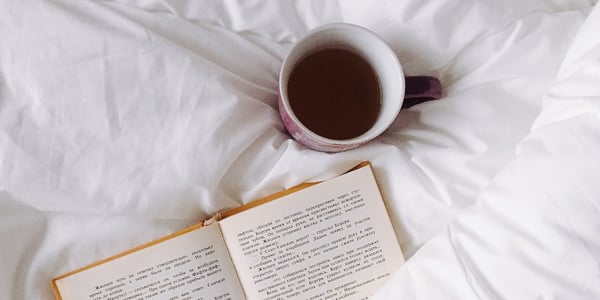Sleep is an essential aspect of our lives, impacting our physical health, mental well-being, and...
How to Make the Most of Your Nighttime Routine
When getting ready for a good night's sleep, having a set routine that is followed every day can help you fall asleep faster and improve your sleep quality. A good night's sleep will help you be better focused, complete your tasks at work or home successfully, and protect the immune system. A better night's sleep all starts with a proper and regular nighttime routine!
The Value of a Bedtime Routine
It is important to have a routine that is followed before going to bed each night as it sends the message to the brain and the body that it is time to prepare for sleep. In addition, it can encourage your body's processes to slow and rest as you are getting ready to end your day. Some of the regular components of a bedtime routine may include packing a lunch for the next day, making a to-do list for tomorrow, brushing your teeth, or reading a book. Preparing the body for sleep helps keep the same schedule and makes it easier to wake in the morning. Tidying up any tasks that may be bothersome if left undone will allow you to achieve a deeper sleep and complete rest.
Nighttime Routine Tips
Avoid Blue Light
 Electronic screens on cell phones, laptops, and televisions, emit blue light. This light affects the body similarly to the sun, communicating that it is daytime and the body should be awake and active. Using a blue light shield on any computers, turning off the blue light on phones or e-readers, and turning off televisions can help the body ease into resting energy. Blue lights are counterproductive for those trying to get to sleep, so cutting them down with blue light glasses or simply turning off all electronics for an hour or two before bed can help to improve sleep quality.
Electronic screens on cell phones, laptops, and televisions, emit blue light. This light affects the body similarly to the sun, communicating that it is daytime and the body should be awake and active. Using a blue light shield on any computers, turning off the blue light on phones or e-readers, and turning off televisions can help the body ease into resting energy. Blue lights are counterproductive for those trying to get to sleep, so cutting them down with blue light glasses or simply turning off all electronics for an hour or two before bed can help to improve sleep quality.
Replacing screens with a relaxing activity such as a restful Yoga sequence, guided meditation, reading a book, or having a relaxing bath can all help to ease the stress in the body and distract the mind from its endless list of tasks. As the body begins to relax, the mind will also slow its thoughts to match the body's energy and begin to relax and prepare for sleep.
Click here to learn more about protecting your eyes in the digital age!
Prepare Mind and Body for Bed
 This step includes showering or washing your face, brushing your teeth, putting on pajamas, and using a relaxing hobby or activity to allow the body to begin to relax. This can include a warm bath, brushing hair, and preparing the bed. Some may find a warm drink or a light snack will help them sleep through the night, and a glass of water can ensure that you go to bed well-hydrated.
This step includes showering or washing your face, brushing your teeth, putting on pajamas, and using a relaxing hobby or activity to allow the body to begin to relax. This can include a warm bath, brushing hair, and preparing the bed. Some may find a warm drink or a light snack will help them sleep through the night, and a glass of water can ensure that you go to bed well-hydrated.
To prepare the mind for sleep, find a relaxing activity or hobby, such as reading or completing a puzzle. Guided meditation can help to slow the thoughts and worries and prepare the brain for a slower time of rest. These activities can also help slow breathing and encourage deep breaths, which will help the body relax further. Relaxing instrumental music or sounds of nature can also help ease you to sleep and help you have a deeper and more relaxed sleep.
Stick to Bedtime and Wake Up Times
 The body works on cycles and will perform at its peak when allowed to remain on one steady schedule. By going to bed at the same time each night and getting up at the same time each morning, the internal body clock adjusts to those times. It will naturally be prepared for sleep at bedtime and will awake on its own in the morning. These times become ingrained in the body's muscle memory. You will feel tired at your regular bedtime and feel awake at the usual time you arise each morning. It is important to not sleep in on weekends or stay up later as it will teach your body to adjust to the later times and make it harder to sleep and get up on the weekdays.
The body works on cycles and will perform at its peak when allowed to remain on one steady schedule. By going to bed at the same time each night and getting up at the same time each morning, the internal body clock adjusts to those times. It will naturally be prepared for sleep at bedtime and will awake on its own in the morning. These times become ingrained in the body's muscle memory. You will feel tired at your regular bedtime and feel awake at the usual time you arise each morning. It is important to not sleep in on weekends or stay up later as it will teach your body to adjust to the later times and make it harder to sleep and get up on the weekdays.
Avoid Caffeine and Sugary Drinks
After dinner, it can be helpful to avoid consuming caffeine or items that have a lot of sugar. These items will provide increased energy and will make it harder to fall asleep. Many drinks have hidden caffeine, such as iced tea, green tea, and some snack foods. Cutting out all caffeine after dinner will help to better prepare your body for rest.
Starting Your Day
Another way to encourage a good night's rest is to have a routine for the morning as well. This can include a gentle alarm that wakes the body slowly, either with quiet music or a relaxing sound that gradually gets louder. Or, try a light that begins gently and gets brighter similar to a sunrise. Waking up slowly in this way will allow for a gradual shift in energy and let yourself prepare for the day compared to being awoken by a loud alarm that could frighten you awake. Muscle memory will prepare the body to wake before your regular waking time. This also helps ease the body awake without sudden sounds or waking frightened, or with increased adrenaline. By starting your day off right, you can keep your internal clock working correctly, and put yourself in a position to sleep well again later that night!
Improving your sleep can be done by creating and maintaining a regular routine and using tasks and hobbies that relax both mind and body in preparation for bed each night. It is important to prepare both your mind and your body for bed with pajamas, brushing teeth, and creating a list of items for the next day to allow the brain to rest fully. These will all help you to sleep longer and more deeply, improving your mood, productivity, and health.






